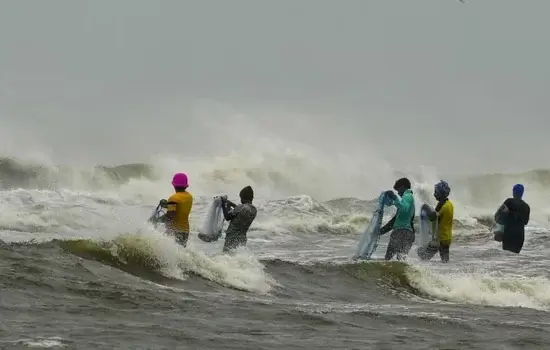Cyclone Fengal, a significant weather event, has commenced its landfall near Puducherry, impacting the coastal regions of Tamil Nadu and Andhra Pradesh. The India Meteorological Department (IMD) has issued warnings of heavy rainfall and strong winds, prompting precautionary measures across the affected areas.
Landfall and Meteorological Details
The landfall process of Cyclone Fengal began around 5:30 p.m. on November 30, 2024, near Puducherry. The IMD reported that the cyclone is expected to cross the north Tamil Nadu-Puducherry coasts between Karaikal and Mahabalipuram, with wind speeds ranging from 70 to 80 km/h, gusting up to 90 km/h.
Impact on Transportation and Infrastructure
In anticipation of the cyclone’s impact, Chennai International Airport suspended operations until 4 a.m. on Sunday, December 1, leading to the cancellation of over 50 flights and leaving numerous passengers stranded.
Additionally, the Southern Railway announced a reduction in the frequency of suburban train services in the Chennai division to ensure passenger safety.
Government Response and Public Advisories
Authorities have declared holidays for educational institutions in several districts of Tamil Nadu and Puducherry. The Department of Revenue and Disaster Management has established toll-free numbers—112 and 1077—for distress calls, and assistance is also available via WhatsApp at 9488981070. Fishermen have been advised to avoid venturing into the sea, and those at sea have been urged to return to shore.
Preparedness and Emergency Measures

The National Disaster Response Force (NDRF) has deployed teams in vulnerable areas to assist with evacuations and relief operations. Local administrations are on high alert, coordinating with state and central agencies to mitigate the cyclone’s impact. Emergency shelters have been set up, and resideneas have been advised to relocate to safer locations.
Historical Context and Naming
Cyclone Fengal, named following the World Meteorological Organization’s guidelines, developed from a deep depression over the Southwest Bay of Bengal. The system intensified into a cyclonic storm on November 29, 2024, and has since been monitored closely by meteorological agencies.
Conclusion
As Cyclone Fengal continues its course, authorities emphasize the importance of adhering to safety advisories and staying informed through official channels. The collaborative efforts of government agencies, emergency services, and the public are crucial in minimizing the cyclone’s impact and ensuring the safety of all affected communities.
Hina Abbasi is Editor and a passionate sports and entertainment content writer at WinnersMaze.com. Hina’s expertise spans across a wide range of sports, and interest in many TV shows allowing her to deliver insightful analysis and compelling stories that resonate with readers.

